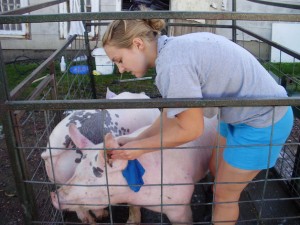It amazes me that in this information age, People for the Ethical Treatment of Animals (PETA) still exists.
With so much access to unbiased research and information, I don’t understand why people still subscribe to the sensationalized, skewed and sometimes downright inaccuracies in PETA’s materials.

But PETA is everywhere. In the last month, I was given a writing assignment on a PETA advertisement for a class, discussed PETA in another class, and I have a PETA pamphlet sitting in my apartment that my roommate received crossing campus. I just can’t escape it.
I grew up raising pigs and other livestock on my family farm, and I’ve been involved in caring for them since I was young. It’s frustrating and mind-boggling to witness my St. Thomas professors and peers misunderstand standard agricultural terms or practices, and many of them rely solely on their knowledge that comes from sources like PETA.
I have always looked at the information PETA and other organizations like it produce with a critical eye because I had the benefit of growing up raising animals. So, I read my roommate’s PETA pamphlet to see exactly what the organization had to say about animals.
The pamphlet frequently presented isolated incidents. For example, one incident described how one pig farm handled moving young piglets from one area to another as common practice.
“Piglets were grabbed by their ears or legs, tossed between the workers, thrown across the room and slammed into transport carts,” the pamphlet read.
Slamming and tossing pigs or grabbing them inappropriately is against industry standards and doesn’t make any sense for a farmer. I know firsthand how important it is to handle young pigs with care to prevent stress and injury.
PETA also positions sustainable and industry-tested practices like managing animal waste, as something wrong or immoral.
One excerpt quoted, without any context, a 35-year-old, outdated “industry” article: “Forget the pig is an animal. Treat him just like a machine in a factory,” and then proceeded to discuss waste management.
“Their waste is pushed through slats beneath them and flushed into huge pits,” the pamphlet read.
Slats are the best solution in the farming industry to prevent pigs from living in their own feces. The concrete pits and slats help to keep living spaces clean and waste safely contained until it can sustainably applied as organic fertilizer for crops.
The fact is, farmers make their living and support their families by raising animals. Animal care and sustainability are the only practices that ensure their success.There are limited incidents of animal abuse, and there are limited instances of poor practices in raising animals, just like there are isolated incidents of child abuse or mistreatment.
The majority of farmers take good care of their animals, just like the majority of parents are constantly looking out for their children’s well-being. Farmers have the same values that consumers have.
Everyone is entitled to his or her own opinion. That opinion, though, should be grounded in fact.
I think it would be beneficial for my St. Thomas peers and professors to re-examine their source of information about the actual problems in the industry rather than be persuaded by sensationalized and skewed advertising.
Heidi Enninga can be reached at enni5264@stthomas.edu.


Fantastic article – really well written and straightforward. I’m glad that you stood up for yourself and your industry by presenting simple rebuttals to some of the accusations made without resorting to attacks. Very nicely done.
Great article. Organizations like PETA only get the attention they want by sensationalizing isolated incidents like you state. PETA wants fair treatment for animals, yet they have no problem creating destruction of labs. Their refusal to even think of what the agruculture industry’s norms are is proof that they have a radical agenda.
Awesome and interesting read! Very insightful indeed. Way to open our eyes to the injustices of heavily biased research! Heidi is a boss.
I like how you brought the country life into the city school, and set the story straight. From what I understand groups like PETA may be appropriate for those few, terrible incidents that do occur, but the whole farming industry should not be scrutinized under the same category. Great article Heidi! Farm on.
This is one of the best opinion articles Tommiemedia has posted lately. Nice work looking at both sides fairly.
I agree with Kathleen. Well written, well-argued article about a relevant topic.
You can tell you’re an FFA member when…
PETA tells some people that its aim is to have animals raised humanely, not necessarily to get people to stop eating meat, fish and eggs, or drinking milk. But that stands in contrast to its omnipresent vegan propaganda, and the most damning evidence of its ultimate agenda is PETA’s statement that “Eating only family-farmed meat is like saying it’s okay to own slaves as long as you treat them nice”. So obviously, the aim of PETA is not treating farmed animals “nice”. It is veganism. That’s why it misrepresents any incidents of animal abuse as being the norm across the board.
I am so glad you wrote this article Because there are a lot of people out there who take what PETA says as the absolute truth. I have a horse and have spent a lot of time around animals. I have been frustrated to say the least at how PETA portrays farms and the treatment of animals. When I was in 4-H a friend of mine was yelled at by a random adult at the county fair for over working his horse because the horse was soaking wet. Well in reality he had just hosed his horse off after riding, and anyone who rides knows this is very humane treatment of a horse. My friend was about 12 at the time and this adult was associated with PETA. I’m sure this adult was looking out for the best interested of the horse, but because she was so uneducated she caused a huge problem.